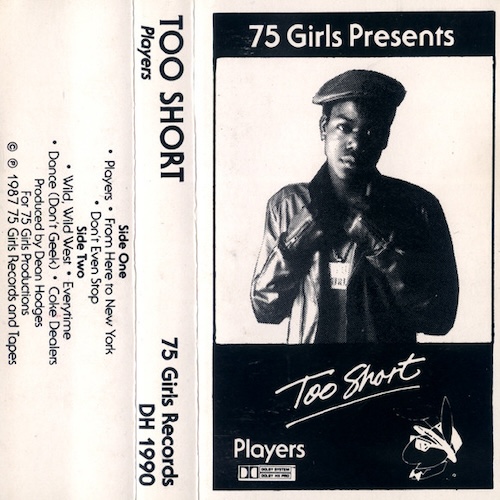If you experienced a sense of déjà vu while reading this review of Too $hort’s “Players” I would understand why. Four years ago I wrote about Todd Shaw’s debut album “Don’t Stop Rappin’” and many (but not all) of the same things apply here.
The first item on our list is the fact original copies of his cassette tapes command premium prices, while a two disc compilation released as “It’s About Time” including both his first and second albums is highly affordable. The second fact is that Mr. Shaw had not definitively established his pimping persona as an emcee, and the fact he sounds more like Run-D.M.C. (rock guitars and all) on songs like the aptly titled “From Here to New York” is self-evident. You can hardly hold that against him given that hip-hop music and culture was exported from the five boroughs of NYC to the four corners of the map.
It was the “Wild, Wild West” for rappers outside of those familiar confines. You can see history repeat itself over and over again if you look for early 1980’s rappers in places like Atlanta, New Orleans, Oakland, Houston, and so on. You can’t have a regional sound if you’ve never heard anything but New York rappers to emulate. It was left to the likes of Todd Shaw and Earl Stevens to establish a style that respected their predecessors but had its own unique regional sound and flair. These things don’t happen overnight but you can hear Sir Too $hort trying to find his way there in his lyrics.
“East coast rappers make all the cream
With a New York rap, and a New York slang
Not too many could spit that game
Now the time has come, and I’ll tell it right
About a rapper like me who will rock the mic
I’m tryin to you wake up on the Western coast
We’re givin you more than just the most”
I don’t know of many better examples of a rapper blatantly explaining his raison d’être in a song. He respects New York and its emcees, he admires their hustle and success, but he wants to “give you more” by creating East Oakland’s own version of it. It’s remarkable in hindsight how fast the scene evolved — not only did a young Too $hort grow to become his own man, but the fierce competition in every urban metropolis across the country quickly ensured that imitating New York wouldn’t cut it. KRS-One stated this best on “My Philosophy” with the words “You got to have style, and learn to be original.” Those who created their own sound were the ones to succeed.
We’re not quite there yet with “Players.” Songs like “Dance” are almost one-to-one copies of the “Planet Rock” style records that proliferated in New York City at the time. The repeated iteration of that sound nearly choked the life out of rap’s commercial rise, but thankfully the up-and-coming NY rappers were just as tired of it if not more so than the public. “The Message” was the tip of an iceberg the scene was crashing into where rap got harder and grittier, and so too would Too $hort on his third album with songs like “Blow Job Betty” and “The Bitch Sucks Dick.” We can grouse about the misogyny but it’s worth saying that he needed an edge and once he found it he sold that fantasy to an audience eager to hear more. The closest we get to that here is “Coke Dealers.”
Ironically here it’s more of a cautionary tale than a glamorization of the lavish lifestyle of said dealers. “Cocaine, the demon, it knows you well/Selling you a trip to a place called Hell.” Even so it’s a rougher subject for Too $hort to rap about, figuratively and literally, and this is where his identity really starts to emerge. If you want vintage “bitch” Too $hort that’s still a few years away, but “Players” has him on his way to becoming a regional star and in a relatively short amount of time he’d be a major player with a major record label deal and worldwide distribution. He hustled like Charlie to get to the top and it all started with a trunk full of cassette tapes.

